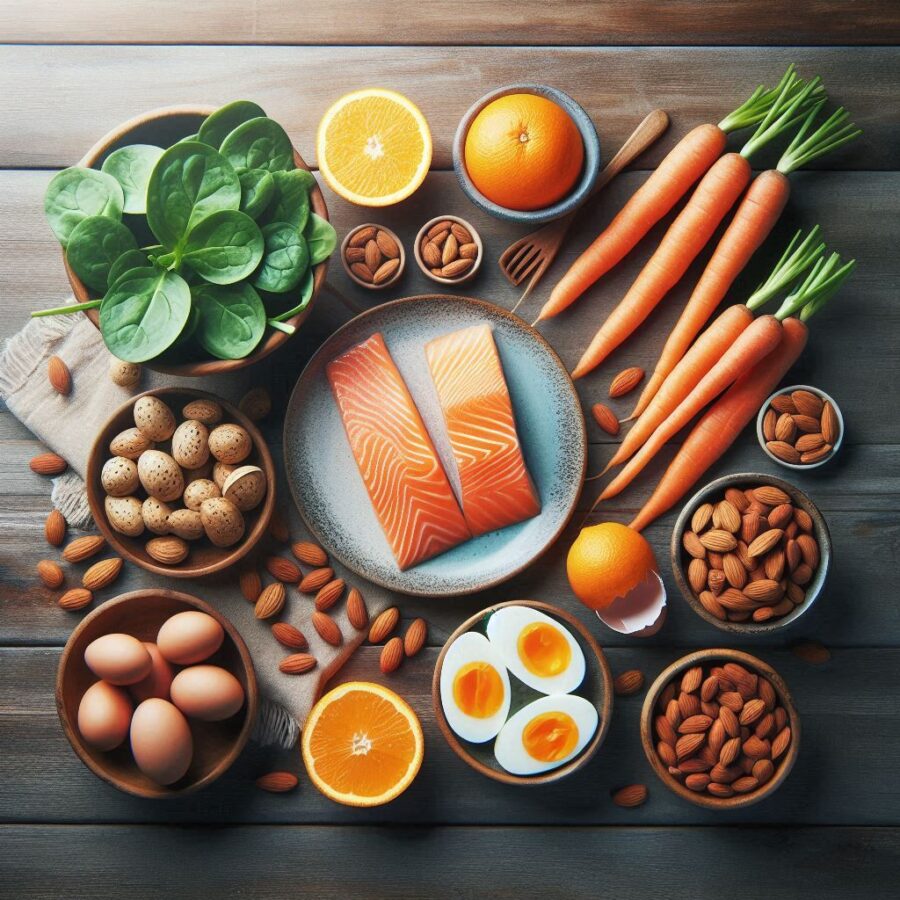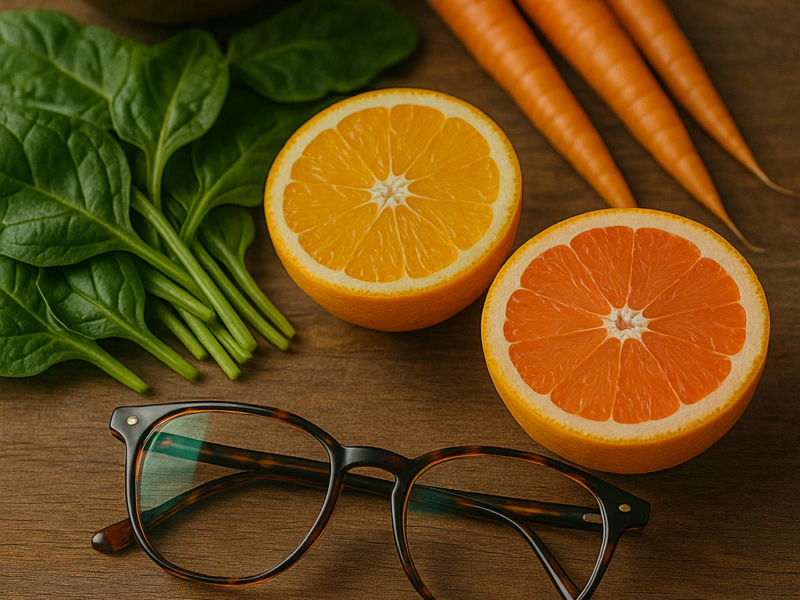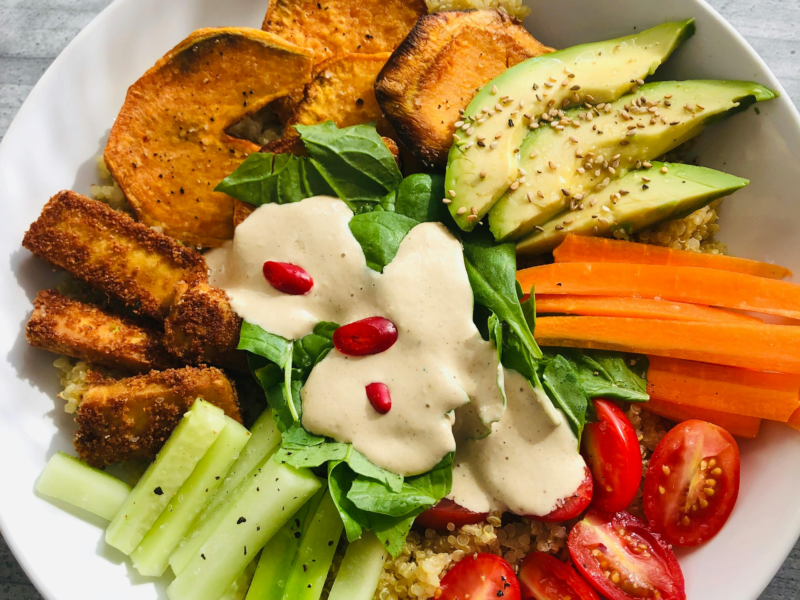Boost your eye health naturally with these nutrient-rich foods
Introduction: Why Nutrition Matters for Eye Health
Your eyes are among the most metabolically active organs in your body, and they require a steady supply of nutrients to function properly. A poor diet accelerates oxidative stress, which can lead to cataracts, macular degeneration, glaucoma, and diabetic retinopathy.
The good news? Eating the right foods can significantly reduce your risk of vision problems. In this article, we’ll explore 7 foods backed by science that protect and improve your eyesight.
👉 Related Reading: Nutrition for Vision: Essential Foods and Supplements for Healthy Eyes
1. Leafy Green Vegetables (Spinach, Kale, Collard Greens)
Leafy greens are rich in lutein and zeaxanthin — carotenoids that filter harmful blue light and protect the retina. They are essential for preventing age-related macular degeneration (AMD).
- Rich in vitamin K, vitamin C, and antioxidants
- Support retinal function and prevent oxidative damage
- Work best when eaten with healthy fats (olive oil, avocado)
Did You Know? 💡 Just one cup of cooked spinach provides over 20 mg of lutein, more than enough to meet daily needs for eye protection.
👉 Related Reading: Macular Degeneration: Early Signs, Prevention, and Effective Treatment Options
2. Carrots and Sweet Potatoes
Carrots are famous for supporting vision due to their high beta-carotene content, which the body converts into vitamin A.
- Prevents night blindness
- Supports corneal and retinal health
- Sweet potatoes are also an excellent source of antioxidants
Useful Tip: Pair beta-carotene rich foods with healthy fats for better absorption.
👉 Related Reading: Eye Care for All Ages: Essential Tips for Lifelong Vision Health
3. Fatty Fish (Salmon, Sardines, Mackerel)
Fatty fish are packed with omega-3 fatty acids (DHA & EPA), which are essential for retinal health.
- Improve symptoms of dry eyes
- Support brain and eye communication
- Reduce risk of macular degeneration
Did You Know? 💡 The retina contains the highest concentration of DHA (a type of omega-3) in the entire body.
👉 Related Reading: Dry Eyes: Causes, Symptoms, Prevention, and Treatment
4. Eggs
Egg yolks contain lutein, zeaxanthin, zinc, and vitamin A — all essential for protecting eye health.
- Support macular pigment density
- Protect against cataracts
- Easily absorbed carotenoids compared to vegetables
Useful Tip: Eating eggs with vegetables (like spinach) enhances carotenoid absorption.
👉 Related Reading: Antioxidants and Vision: How Vitamins A, C, and E Protect Your Eyesight Naturally
5. Citrus Fruits (Oranges, Grapefruits, Lemons)
Vitamin C is a powerful antioxidant that helps protect the lens of the eye from oxidative stress.
- Reduces risk of cataracts
- Supports collagen production in the cornea
- Enhances blood vessel health in the retina
Did You Know? 💡 People who consume high levels of vitamin C have a 20% lower risk of cataract progression.
👉 Related Reading: Cataracts: Causes, Symptoms, Prevention, and Treatment
6. Nuts and Seeds (Almonds, Walnuts, Chia Seeds, Flaxseeds)
These foods are rich in vitamin E and omega-3 fatty acids.
- Vitamin E protects retinal cells from oxidative stress
- Walnuts and flaxseeds provide ALA (a plant-based omega-3)
- Reduce inflammation that contributes to eye diseases
Useful Tip: A handful of almonds daily provides nearly half of your recommended daily vitamin E intake.
👉 Related Reading: Preventing Vision Loss: Comprehensive Guide to Protecting Your Eyesight Naturally
7. Berries (Blueberries, Blackberries, Strawberries)
Berries are high in anthocyanins and vitamin C, which support circulation and reduce oxidative stress in the eyes.
- Protect against retinal damage
- Enhance night vision
- Reduce risk of diabetic retinopathy
Did You Know? 💡 Bilberry extract has been shown to improve night vision and protect retinal health in several studies.
👉 Related Reading: Vision Biohacking: Cutting-Edge Strategies to Improve Your Eyesight Naturally
How to Incorporate These Foods into Your Diet
- Start your day with a spinach and berry smoothie
- Add grilled salmon or sardines twice a week
- Snack on almonds and citrus fruits daily
- Add eggs to breakfast or salads
- Rotate colorful vegetables like carrots and sweet potatoes
Useful Tip: Consistency matters — your eyes benefit most from a long-term healthy eating pattern, not occasional “superfood” boosts.
🛒 Recommended Products for Eye Nutrition
1. PreserVision AREDS 2 Formula
– Clinically proven formula with lutein, zeaxanthin, vitamin C, E, zinc, copper
👉 Shop PreserVision AREDS 2
2. Bausch + Lomb Ocuvite Adult 50+
– Daily multivitamin for eye health, ideal for adults
👉 Check Ocuvite on Amazon
3. Performance Lab Vision
– Advanced eye formula with lutein, zeaxanthin, bilberry & astaxanthin
👉 Get Performance Lab Vision
4. Triple Strength Omega-3 Fish Oil
– Supports dry eyes, retina, and overall visual function
👉 Buy Omega-3 Supplement
5. Garden of Life Vitamin Code Multivitamin
– Organic formula with natural antioxidants and carotenoids
👉 Shop Multivitamin
❓ Frequently Asked Questions (FAQ)
Q1: Can food alone prevent eye diseases?
A: A healthy diet reduces risk significantly, but genetics and lifestyle factors (smoking, UV exposure) also play a role.
Q2: How much lutein should I get daily?
A: Studies suggest 10 mg lutein and 2 mg zeaxanthin daily for optimal macular support.
Q3: Do supplements replace a healthy diet?
A: No. Supplements fill gaps, but food sources provide additional nutrients and synergy.
Q4: Which foods are best for dry eyes?
A: Omega-3 rich fish, nuts, and seeds help lubricate eyes and reduce inflammation.
Q5: How long until diet changes impact eye health?
A: Benefits usually appear after 3–6 months of consistent healthy eating.
Key Takeaway
Your diet plays a crucial role in protecting and improving your vision.
By eating a variety of leafy greens, carrots, fatty fish, eggs, citrus, nuts, and berries, you supply your eyes with the antioxidants and nutrients they need for lifelong health.
👉 Related Reading: Eye Care for All Ages: Essential Tips for Lifelong Vision Health


